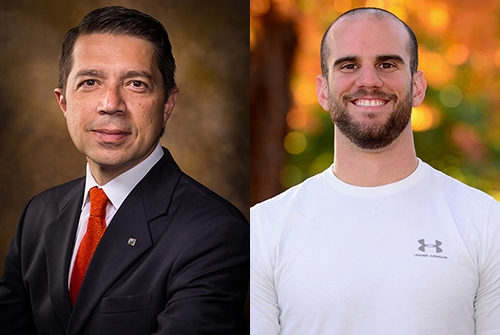New research conducted by a team that included a University of Arkansas graduate student and faculty member indicates drinking milk and water is associated with better hydration in children when compared to other fluids.
Adam Seal, a doctoral student in exercise science, and Stavros Kavouras, professor of exercise science, co-wrote a paper titled "Fluid Consumption Pattern and Hydration Among 8-14 Years-Old Children" published in the European Journal of Clinical Nutrition. Seal and Kavouras are part of the University of Arkansas Hydration Science Lab. Kavouras established the lab in 2016 to provide formal structure to the research being done by students and faculty investigating water as an important nutritional component. Adequate water intake is critical to maintain health.
Children drink a variety of fluids to meet dietary water intake needs, but the effect of different fluid types on hydration is unclear, according to the article. The study was intended to develop fluid intake patterns and examine their association with hydration, as determined by lab tests on study participants' urine.
The article reported results from data collected on two consecutive days from 210 healthy children in Greece between the ages of 8 and 14. It compared the effect on hydration of six patterns of fluid-intake: milk and fresh juice, regular soda and other drinks not including water, fresh juice and other drinks, packaged juice, water and milk, and fresh juice.
The researchers measured urine osmolality, a commonly used biomarker for determining hydration. The measure indicates how concentrate urine is.
"To our knowledge, this is the first study to examine the relationship between fluid intake patterns and hydration in children," the article said. "Interestingly, a recent study based on the 2009-2011 National Health and Nutrition Examination Survey data reported that one in four children and adolescents in the United States do not consume any plain water, while more than 70 percent consume an average of two glasses of sugar-sweetened beverages per day."
The new study showed that the fluid intake pattern consisting of regular soda and other drinks, in the absence of plain water, was linked to inferior hydration.
Topics
Contacts
Heidi S. Wells, director of communications
College of Education and Health Professions
479-575-3138,
